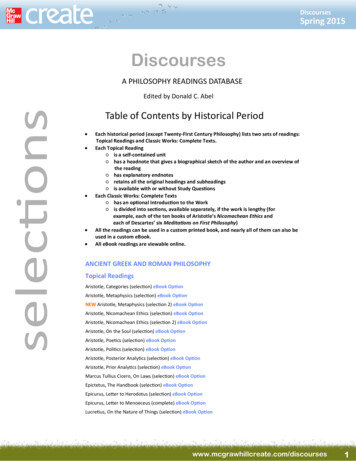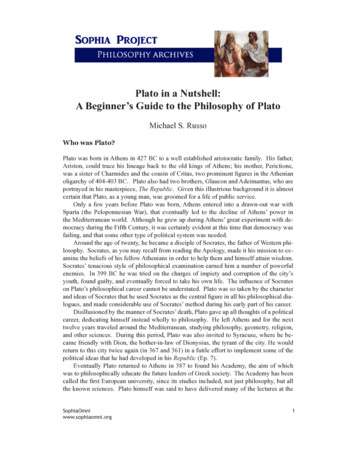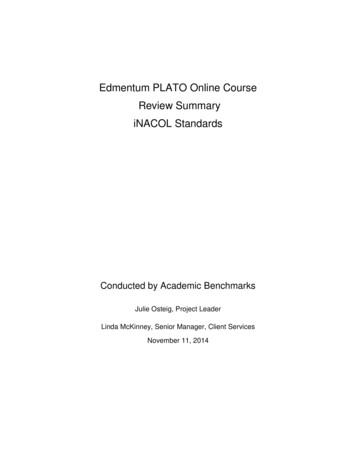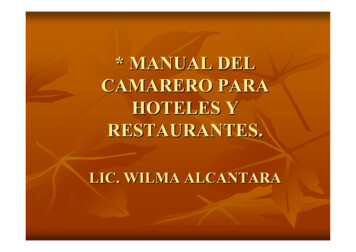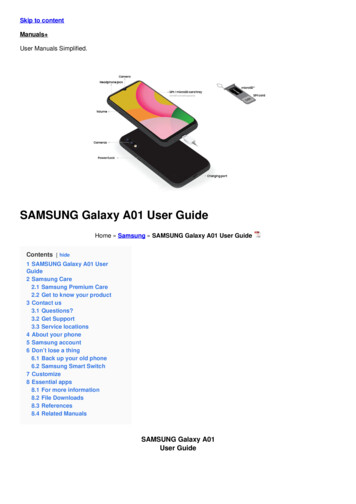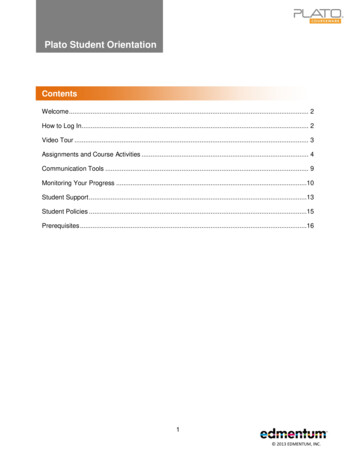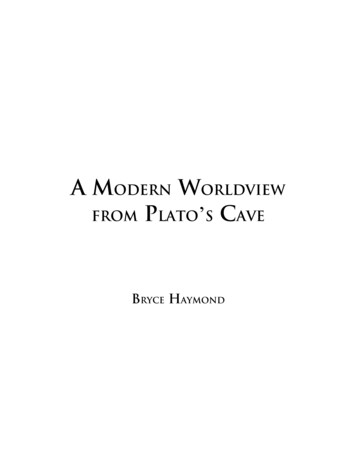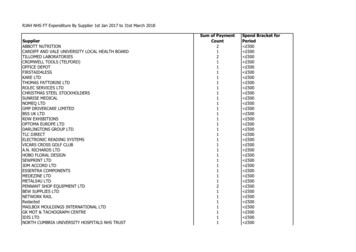
Transcription
PROVISIONAL DRAFT: This syllabus provides a sense of what the courseinvolves, but it is not the final official syllabus.PHIL 500 A01 (TBA) – PLATO’S REPUBLICFall 2022, University of VictoriaDepartment of PhilosophyCourse website: TBAInstructor & Contact InformationDr. Clifford Roberts (cliffordroberts@uvic.ca)Office hours: Tue-Wed 10:30am-12pm (or by appt.)Office: CLE B318Meeting Times: Tue-Wed-Fri 12:30-1:20Meeting Place: TBACourse DescriptionPlato’s Republic is one of the most imaginative, influential, controversial, and rich works in thehistory of Western philosophical reflection. It covers a dizzying variety of topics: the ideal politicalsystem, the best form of education, the nature and value of art, the correct analysis of belief andknowledge, the nature of virtue and happiness, the structure and constitution of the mind, the listcould go on. All these topics are tied together in an outrageous conceit: an analogy betweenpolitical and psychological structure. The Republic also offers us Plato’s sustained thinking on topicscentral to his philosophical outlook, among which: the Theory of Forms, the relation between thesensible and intelligible worlds, the place of mathematics in cognition, and the role of reason in avirtuous and happy life. In this course, we will read through the entirety of the Republic together withcontemporary scholarly material; our goal is to deploy contemporary concepts, methods of analysisand reasoning in order to develop a deeper, richer and more precise understanding of the text whileavoiding the dangers of anachronism or literalness.Course TextsRequired: Plato, The Republic, trans. G. M. A. Grube, rev. C. D. C. Reeve (Hackett, 1992)*All other readings for the course will be made available on Brightspace*Course Assignments(1)Explain & CritiqueValue: 15% per assignment, 2 assignments (total value 30%)Assignment: In 500 words, students will i) briefly summarize a line of argument orreflection in a given week’s article and ii) raise one substantive critique of the article withregard to how it reads or understands the course text. Late assignments will not beaccepted.Due dates: Monday by 11:59PM of the week after the article was discussed.(2)Short EssayValue: 30%Length: 1500 wordsAssignment: Students will complete an essay of the relevant length either i) on one of aset of assigned topics or ii) on a topic of their choosing in consultation with theinstructor. Topics will be handed out 2 weeks in advance.Due dates: see course schedule.
(3)Long EssayValue: 40%Length: 2500 wordsAssignment: Students will complete a paper of the relevant length either i) on one of aset of assigned topics, ii) on a topic of their choosing in consultation with the instructoror iii) by revising and developing their short essay. Topics will be handed out 3 weeks inadvance.Due dates: see course schedule.Course Grading
Interpretation of these grade definitions is up to the discretion of the instructor. If you receive agrade during the course that you believe is unfair, please begin by discussing the matter with theinstructor in a respectful, open-minded manner. Rest assured that if you still believe the grade youreceived is unfair you can appeal the matter to the chair of the department. For additionalinformation regarding grades, please see the September 2022 issue of the academic calendar (onlinehere: Grading). All evaluations of tests and assignments will be calculated according to percentagescores. Letter grades and grade point scores are listed purely for reference.Academic IntegrityAcademic integrity is intellectual honesty and responsibility for academic work that the studentsubmits, whether individual or group work. It involves commitment to the values of honesty, trust,and responsibility. It is expected that students will respect these ethical values in all activities relatedto learning, teaching, research, and service. Therefore, plagiarism and other acts against academicintegrity are serious academic offences.The responsibility of the institutionInstructors and academic units have the responsibility to ensure that standards of academic honestyare met. By doing so, the institution recognizes students for their hard work and assures them thatother students do not have an unfair advantage through cheating on essays, exams, and projects.The responsibility of the studentPlagiarism sometimes occurs due to a misunderstanding regarding the rules of academic integrity,but it is the responsibility of the student to know them. If the student is unsure about the standardsfor citations or for referencing sources, the instructor should be consulted. Depending on theseverity of the case, penalties include a warning, a failing grade, a record on the student’s transcript,or a suspension.It is the student’s responsibility to read and understand the University’s policy on academic integrity.For the policy, see the September 2022 edition of the academic calendar (online here: University ofVictory Statement on Academic Integrity).Intellectual property of materials on the LMS websitePlease note that all assignments for this course and all materials posted to the LMS website arethe intellectual property of myself and the University of Victoria. Do not circulate this materialor post it to note-sharing sites without the instructor’s permission. Posting course materials tonote-sharing sites or otherwise circulating course materials without the permission of yourinstructor violates the Policy on Academic Integrity (link above). Any evidence that you arecirculating materials without permission will be referred to the Chair of the PhilosophyDepartment for investigation.Policy on Late or Missed AssignmentsWith the exception of the Reading Questions, all assignments submitted on or before thespecified due dates will be adjudicated and returned with written comments. Assignments submittedwithin one week after the specified due dates will be adjudicated without penalty; however, theywill be returned without written comments. Lastly, any assignment submitted more than one week
after the specified due date will be adjudicated and returned without comments, and a penalty of 6%per day will be assessed, unless the student can provide official documentation of the reason for thedelay (e.g., a physician’s note). The previous policies do not apply to students with documenteddisabilities; all attempt will be made to accommodate such students including, but not restricted to,providing make-up assignments and tests.AccessibilityThe University of Victoria is committed to creating a learning experience that is as accessible aspossible. If you anticipate or experience any barriers to learning in this course, please feel welcometo discuss your concerns with me. If you have a disability or chronic health condition, or think youmay have a disability, you may also want to meet with an advisor at the Centre for AccessibleLearning (CAL). For more information about CAL, see: https://www.uvic.ca/services/cal/Counseling ServicesMany, if not most, students experience some difficulties with their mental health during their yearsas undergraduate students. Make sure you are familiar with the university’s Counseling )which is an excellent resource you have at yourdisposal on campus. It is hard to shake the stigma associated with problems like depression andanxiety, but if at any point you can benefit from help with mental health issues, please contactCounseling Services. They genuinely want to help, and why not take advantage of this free resource?Important DatesPlease consult the university calendar’s Academic Year Important Dates for information aboutlast possible dates to withdraw from courses without penalty, examinations period start/end dates,and so on: https://www.uvic.ca/calendar/dates/Academic AdvisingFor information about declaring a program, academic concessions or interpreting your CAPPreport, please visit Undergraduate Advising (https://www.uvic.ca/services/advising/) or make anappointment with an adviser.Territory AcknowledgmentThe University of Victoria is committed to acknowledging and respecting the Songhees,Esquimalt and WSÁNEĆ peoples on whose traditional territory the university stands andwhose historical relationships with the land continue to this day. For information about support forindigenous students and efforts to foster reconciliation, please visit the Office of IndigenousAcademic & Community Engagement: https://www.uvic.ca/services/indigenous/.Course ScheduleDatesAssignmentsWeek 1: Sep 7-9Readings: Malcolm Schofield, “Approaching theRepublic”
Week 2: Sep 12-16Readings: Republic Bk. IRachel Barney, “Socrates’ Refutation ”Week 3: Sep 19-23Readings: Republic Bk. II.357a-376dNicholas White, “The Classification of Goods ”Week 4-5: Sep 26-30, Oct 3-7Week 6: Oct 10-14Week 7: Oct 17-21Readings: Republic Bk. II.376d – IIIMalcolm Schofield, “Music all pow’rful” §§1-4Gabriel Lear, “Mimesis & Psychological Change”James Wilberding “Curbing One’s Appetites in Rep.”Readings: Republic Bk. IVRachel Singpurwalla, “The Tripartite Theory ”Readings: Republic Bk. VDirk Baltzly, “Knowledge & Belief in Rep. V”Short Essay Due Oct. 17Week 8: Oct 24-28Readings: Republic Bk. VIGerasimos Santas, “The Form of the Good in Rep.”Week 9: Oct 31-Nov 4Readings: Republic Bk. VIIMalcolm Schofield, “Metaspeleology”Allan Silverman, “Book VII”Week 10-11: Nov 7-8, 14-18*Reading Break Nov 9-11*Readings: Republic Bk. VIII-IXZena Hitz, “Degenerate Regimes in Plato’s Republic”Week 12-13: Nov 21-25, Nov. 28-Dec 2Readings: Republic Bk. XElizabeth Belfiore, “Plato’s Greatest Accusation ”Francisco J. Gonzalez, “Combating Oblivion ”Long Essay Due Dec 5
PHIL 500 A01 (TBA) - PLATO'S REPUBLIC Fall 2022, University of Victoria Department of Philosophy Course website: TBA Instructor & Contact Information Dr. Clifford Roberts (cliffordroberts@uvic.ca) Meeting Times: Tue-Wed-Fri 12:30-1:20 Office hours: Tue-Wed 10:30am-12pm (or by appt.) Meeting Place: TBA

